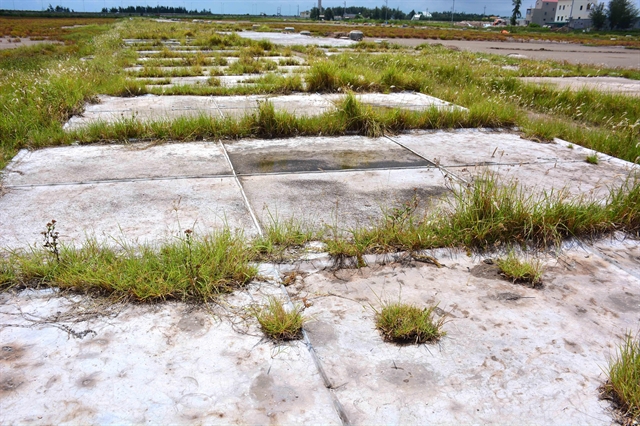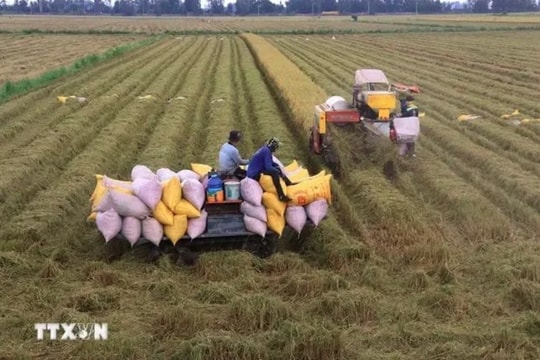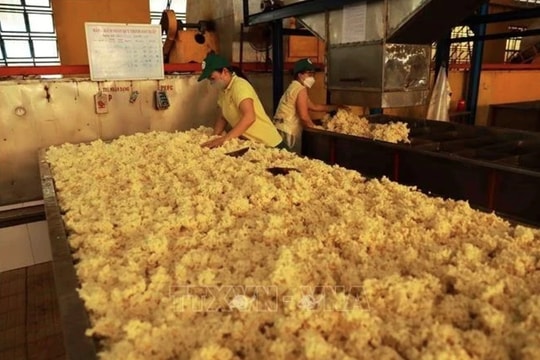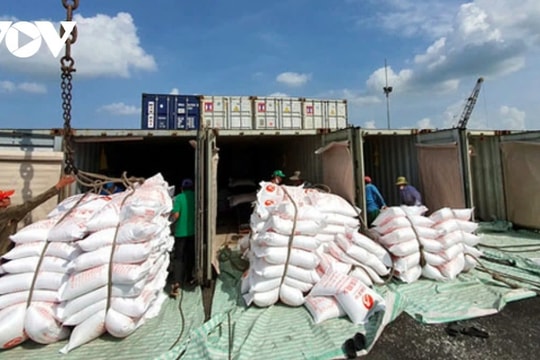 |
| Salt fields abandoned in Nam Định Province as farmers seek better opportunities elsewhere. — VNA/VNS Photo Công Luật |
HÀ NỘI — The once-thriving salt industry in Việt Nam is declining as harsh working conditions and low incomes have driven many salt farmers to quit and find other jobs.
The decline is prominent in Hòa Lộc Commune, which was a salt-making hub in Hậu Lộc District, Thanh Hóa Province. Its salt farms have dwindled by two-thirds in area over the last 10 years, with hardly any young men remaining in the industry.
"About 300 families in the commune continue to make salt today," said Lê Văn Kiên, Deputy Director of Tam Hòa Salt Cooperative.
"The workforce is comprised predominately of the elderly and women, as young men have left the industry to find jobs elsewhere."
He cites low income and the physically demanding nature of the work as the main factors driving farmers away from salt making.
Kiên takes the monthly average income of salt farmers in Hòa Lộc in 2023 as an example, which stood at around VNĐ3 million (US$122) per family, barely enough to make ends meet.
"Salt making is backbreaking but never pays well. That's why it is losing appeal to farmers," he said.
Kiên also describes a vicious cycle where low income prevents investment in better equipment, leading to poor-quality salt, lower prices and even lower income, ultimately forcing farmers to quit.
Due to a lack of market power, farmers often find themselves at the mercy of traders, who force down prices to exploit the situation. Cooperatives have attempted to offer higher prices for salt to help farmers but they do not have the funds to keep the support going.
"Tam Hòa Salt Cooperative has limited capacity to do anything beyond acting as a liaison and providing irrigation services," said Kiên.
The situation is not any better in Cát Minh Commune, Phù Cát District, Bình Định Province, where about 600 families produce salt for a living.
A farmer in Cát Minh describes the job as a labour-intensive process. Farmers must spend months preparing their fields by leveling the land, drying the mud and compacting the soil.
Under the scorching sun, they work tirelessly in the fields to harvest the salt. The intense heat and humidity often take a toll, leaving them with sunburnt skin and weary bodies.
Despite the hardship, their lives are a constant gamble, as their income is subject to the whims of nature and the market, which hardly act in their favour.
He highlights the stark contrast between the high costs of salt making and the low returns, noting that even without factoring in the costs of pumping seawater and leveling the land, farmers still have to spend about VNĐ60 million ($2,438) for every 1,000sq.m of plastic sheet-covered fields, only to earn around VNĐ1,000 (4 cents) per kilo of salt.
"Considering we earn merely VNĐ1,000 for every kilo of salt, it's no wonder we are struggling to make a profit," said the farmer.
Đoàn Thị Hường, a salt farmer in Bạch Long Commune, Giao Thủy District, Nam Định Province, says the situation was tough this year as a lack of sunshine has led to fewer workdays in the fields, reducing salt yield.
Recent salt price drops worsened the situation, leaving her with insufficient income to cover the upkeep costs. Some of her salt-making facilities have begun to fall into disrepair.
"On a sunny day, working at our maximum capacity, we can produce about 80kg of salt. But this year's excessive rainfall, notably heavy rains in July, has reduced our yield," said Hường.
She attributes salt farmers' low income to their limited access to advanced technology, which could be improved by launching capability-building and training programmes.
Provincial governments have responded to salt farmers' call for help, with Nam Định being at the forefront.
Its Department of Agriculture and Rural Development has stepped in to bring businesses and salt farmers together, facilitating capability-building and training programmes.
A notable example of business-farmer cooperation is the Project to Build Clean Salt Farms for Export, launched in 2022 by Nam Định Trading and Salt JSC and a group of salt farmers in Bạch Long.
Under the project, the farmers have received extensive training on clean salt production and funding to upgrade their equipment and facilities.
After two years, they have been able to produce higher quality salt, fetching a premium of approximately VNĐ600 (2 cents) per kilo compared to regular sand.
The 86 tonnes of high-quality salt produced in 2023 have provided substantial economic relief to the community.
The Department has also organised trade fairs and meetings to help salt producers expand their market reach. It has also engaged farmers in salt value chains and assisted them in joining the national One Commune One Product (OCOP) Programme.
Scores of salt producers in the province have been certified as OCOP products thanks to the assistance.
While it takes time for supportive policies to make a visible difference, these initial results offer a glimmer of hope for the industry's resurgence in the short term. — VNS























